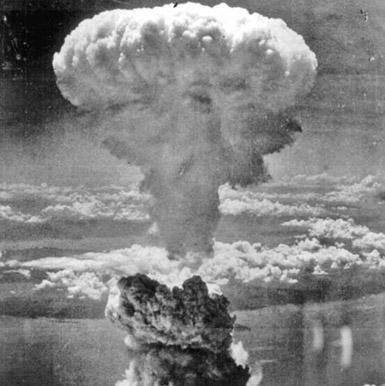
Robert S. McNamara, the secretary of defense who masterminded the U.S. war on Vietnam, calls our situation "Apocalypse Now." In the May-June issue of Foreign Policy he wrote:
On Saturday, August 6, it will have been 60 years since the U.S. exploded the first nuclear bomb on the city of Hiroshima, Japan, incinerating some 80,000 people, mostly civilians, and killing an additional 160,000 through lingering radiation poisoning, injuries, and sickness attributable to polluted water and destroyed infrastructure. Three days later, the U.S. dropped another bomb on Nagasaki, killing another 100,000. No other country has used a nuclear weapon.To launch weapons against a nuclear-equipped opponent would be suicidal. To do so against a nonnuclear enemy would be militarily unnecessary, morally repugnant, and politically indefensible.
There is no way to effectively contain a nuclear strike—to keep it from inflicting enormous destruction on civilian life and property, and there is no guarantee against unlimited escalation once the first nuclear strike occurs. We cannot avoid the serious and unacceptable risk of nuclear war until we recognize these facts and base our military plans and policies upon this recognition.
If the United States continues its current nuclear stance, over time, substantial proliferation of nuclear weapons will almost surely follow.
Perhaps not surprisingly, we in the U.S. are haunted by nukes. A recent survey reports that:
Unhappily, among our rulers there is a faction that thinks planning to launch a nuclear strike is not only justified "in some circumstances," but good policy should non-state terrorists such as Al-Qaeda again attack the U.S. mainland. According to former CIA analyst Philip Giraldi writing in the American Conservative [by way of Juan Cole:]Americans are far more likely than the Japanese to expect another world war in their lifetime, according to AP-Kyodo polling 60 years after World War II ended.
…
Six in 10 Americans said they think such a war is likely, while only one-third of the Japanese said so, according to polling done in both countries for The Associated Press and Kyodo, the Japanese news service.
"Man's going to destroy man eventually. When that will be, I don't know," said Gaye Lestaeghe of Freeport, La.
. . .
Asked whether a first strike with nuclear weapons ever could be justified, a majority in both countries said no. But Americans were twice as likely as the Japanese to think such a strike might be justified in some circumstances.
Numerous commemorations and protests are planned for August 6-9. At the four major regional weapons facilities (Livermore Labs, CA; Los Alamos Labs, NM; the Nevada Test Site outside Las Vegas; and the Oakridge, TN facility) thousands of mourners and protesters will gather. Hundreds of other events are planned throughout the US; check the list here. If we hope for a future, these activities are a beginning.The Pentagon, acting under instructions from Vice President Dick Cheney's office, has tasked the United States Strategic Command (STRATCOM) with drawing up a contingency plan to be employed in response to another 9/11-type terrorist attack on the United States. The plan includes a large-scale air assault on Iran employing both conventional and tactical nuclear weapons.
. . .
As in the case of Iraq, the response is not conditional on Iran actually being involved in the act of terrorism directed against the United States. Several senior Air Force officers involved in the planning are reportedly appalled at the implications of what they are doing--that Iran is being set up for an unprovoked nuclear attack--but no one is prepared to damage his career by posing any objections.
No comments:
Post a Comment